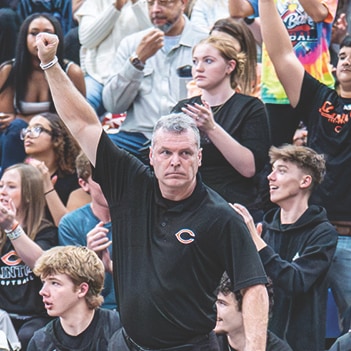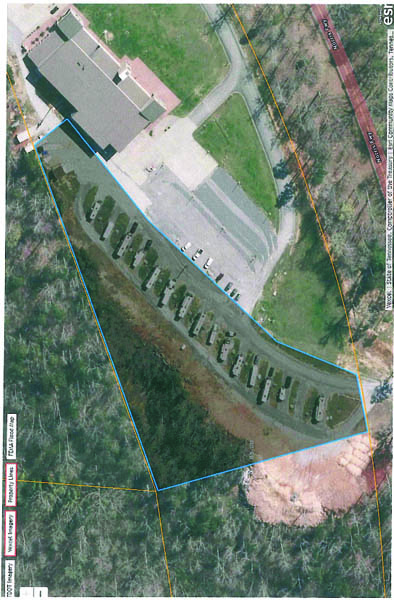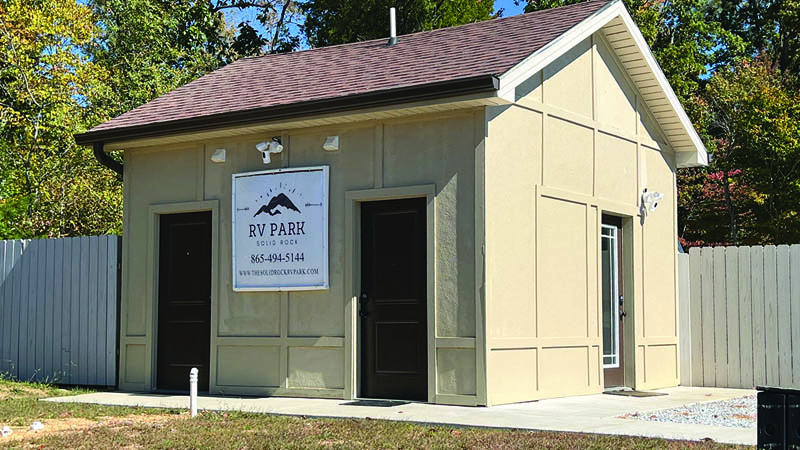Covenant Life seeks zoning for RV park
After operating its recreational-vehicle park in Norris illegally for about five years before being shut down by a federal court in May, Covenant Life Church has now decided to follow the rules and ask the city to rezone the site to allow for the campground.
The church’s request, which could result in rezoning of a 3.3-acre tract on the church’s 17.6-acre campus along Andersonville Highway to commercial use, is set to be heard by the Norris Planning Commission at 6 p.m. July 1 in the Norris council chambers in the Community Building.
If approved by the Planning Commission, the rezoning request would then have to be considered by the City Council, which would need to pass a zoning ordinance on two readings to make the change to C2 (Commercial) zoning from the current P1 (Professional and Civic).
Then, the church would be required to submit an engineered site plan to the Planning Commission to obtain building permits, a prerequisite to getting a certificate of occupancy to allow the RV park to operate.
But the church also has filed an appeal with the Norris Board of Zoning Appeals to try to overturn the city building inspector’s denial in mid-May of a certificate of occupancy that would have allowed the church to continue operating the RV park, which Covenant Life has recently recast as a “religious retreat” for owners of recreational vehicles.
The BZA will meet to consider the appeal at 5:30 p.m. July 1, prior to the Planning Commission’s regular July meeting.
Covenant Life has carved out the 3.3-acre site for the RV park from its 17.6-acre church campus at 151 Sycamore Place. The site is accessible by entry from Andersonville Highway via Sycamore Place, or from Norris Freeway/U.S. 441 across from Cross Pike
Road.
A site plan filed with the rezoning application includes a satellite photo that outlines the 3.3-acre parcel, and also shows the RV park in operation with 15 travel trailers parked in the 16 spaces that were constructed in 2018-19. The sites include water, sewer and electrical hookups, along with picnic tables for each.
The last six trailers remaining on the site were removed on May 30 and 31 in time to comply with a federal court order issued May 1 that required them to be gone no later than May 31. The order resulted from a lawsuit filed by Norris in U.S. District Court in Knoxville last fall seeking a shutdown of the park.
“The lawsuit is still ongoing,” Norris City Manager Adam Ledford said after the May 31 deadline. “But [the moving of the trailers] complies with the order of the judge consistent with the current state of the case. There are still some outstanding legal issues.”
Covenant Life opened the facility as the Solid Rock RV Park in 2019, promoting it on the website thesolidrockrvpark.com, which allowed users to make reservations and pay the camping fees all online.
But the city of Norris said the RV park was opened illegally, because the church did not first obtain a required zoning change from the city, or present a site plan and secure building permits necessary to install the park’s infrastructure.
Norris eventually took the church to the court in Knoxville to force the removal of the trailers. During most of its operations, Solid Rock RV Park’s 16 campsites were filled, and many if not most tenants of the trailers were longtime residents of the park.
Initially, the church charged those campers $800 a month rent for each campsite, and the tenants reported that the church automatically drafted the rental fees from their bank accounts.
But later, after Norris began challenging the church over its operation of the RV park, the church began referring to it as the “Solid Rock Retreat,” and said in court filings that it never charged anyone for staying there. What the tenants paid to the church was characterized as “voluntary donations,” the church contended.
On May 1, U.S. District Judge Charles E. Atchley Jr. in Knoxville ordered the church to shut down the park and remove the recreational vehicles from it within 30 days.
Despite Covenant Life’s assertions to the contrary, the church’s own attorney, Daniel Sanders of Knoxville, had acknowledged in Anderson County Chancery Court that the church built and opened Solid Rock RV Park as a commercial enterprise on church property.
The pending application for the rezoning and the separate appeal to the Norris BZA were filed by Knoxville attorney Daniel Sanders, who has been representing the church in its legal wranglings with the city.
After the last trailers were removed from the site, Sanders declined to make any statements about the facility to The Courier News, other than to say he did not agree with the newspaper calling it an RV park.
In its own court filings, the church insisted that it had never charged anyone any rent for the RV spaces, but only asked for donations.
The church also swore that it operated the “retreat” only as a Christian ministry, and that it’s just a “parking lot,” and was never intended to be an RV park, as such:
“ … (T)he Church provides overnight parking and accommodation to congregants, missionaries, and others in need as a form of Christian retreat and an exercise of deeply held religious belief,” attorney Sanders said in a letter to the city included in a court filing. “I am informed that no commercial transactions are involved.
“Rather, the Church accepts offerings essential for the maintenance of its facilities on a free-will basis.
“Individuals who utilize the overnight parking areas receive prayer and reading of Holy Scripture. They are expected to attend worship services, commune with Church leaders, and participate in other religious programs available on the Church property.
“Indeed, the Church offers certain religious programs tailored to the needs of those who use the overnight parking at times when regular congregants are not present at the Church. Missionaries utilize Church facilities to further their ministries and other charitable and religious purposes.”
The church also argued in its court filings that it’s use of the property for the overnight parking of RVs was allowed under city zoning laws because the area is simply a “parking lot,” not an RV park.
City officials countered that if it were only a parking lot, the church would not have needed to install water, sewer and electrical hookups to each of the 16 spaces, nor would it have needed to build a bathhouse – since removed by the church -- which had a sign on it saying, “Solid Rock RV Park.”
Additionally, the church had applied to and received a permit from the Tennessee Department of Health earlier this year to operate the RV park as an “organized camp,” the city’s filings note.
In closing, in its Dec. 8, 2023, filing with the U.S. District Court, Norris said:
“The city has demonstrated that all of the factors supporting a grant of preliminary injunctive relief have been met. This Court should enter a preliminary injunction in the City’s favor … “
In November, the church quietly tore down and removed the bathhouse in an apparent tacit admission that its construction was not legal under Norris building and zoning codes.
But the city also noted in the Dec. 8 court filing that Covenant Life even violated city ordinances in its destruction of the bathhouse, by
doing so without a city permit.
City council members authorized the countersuit and the move of the case to federal court from Anderson County Chancery Court after meeting with the city’s lawyers in a closed session Sept. 6.
This move came after the church filed its own lawsuit in Chancery Court in August, seeking to prevent the city from turning off water service to the church in response to Covenant Life’s action to provide Norris city water to the Solid Rock RV Park in violation of a June agreement with the city not to do so.
In its lawsuit against the city, Sanders argued that Norris was in violation of the 14th Amendment to the U.S. Constitution in threatening to cut off water to the church without first going through court to do so.
The 14th amendment says, “No state shall make or enforce any law which shall abridge the privileges or immunities of citizens of the United States; nor shall any state deprive any person of life, liberty, or property, without due process of law; nor deny to any person within its jurisdiction the equal protection of the laws.”
During the “emergency” hearing in Chancery Court last Aug. 18, Chancellor James W. Brooks Jr. found no grounds for a claim based on the 14th amendment, and declined to issue the restraining order sought by the church.
But city officials have said that by opening a claim
under the U.S. Constitution, Covenant Life cleared the way for moving the case to the U.S. District Court in Knoxville.




